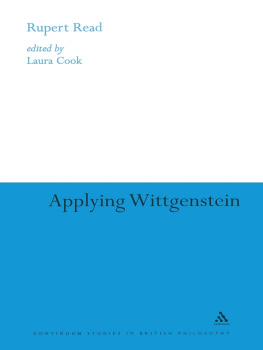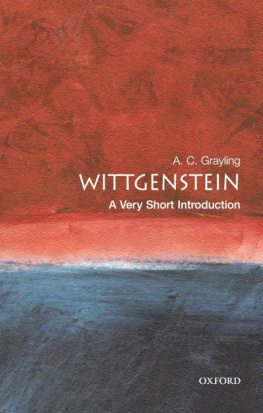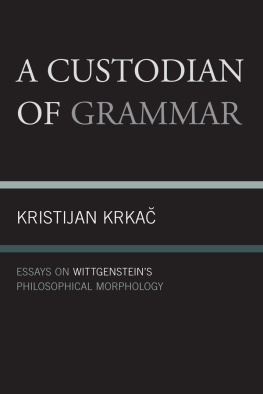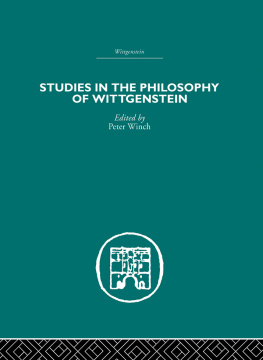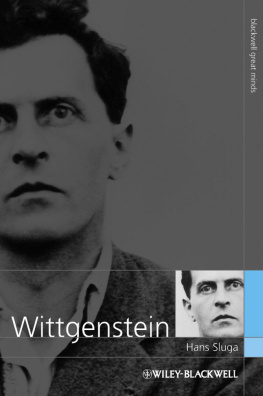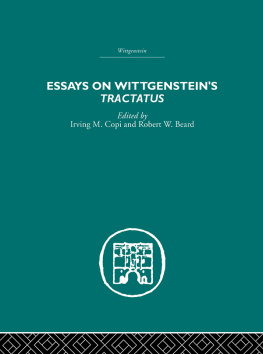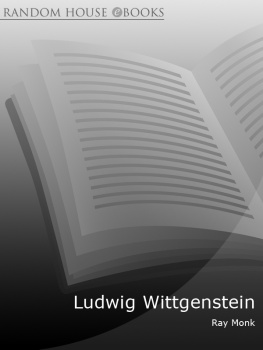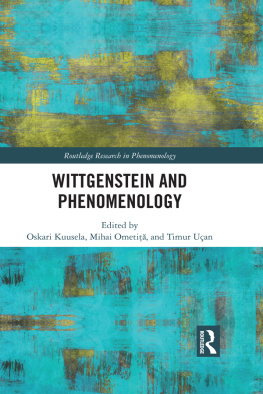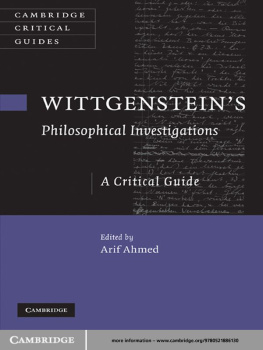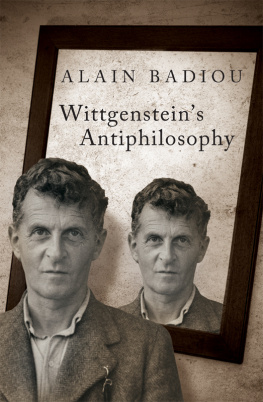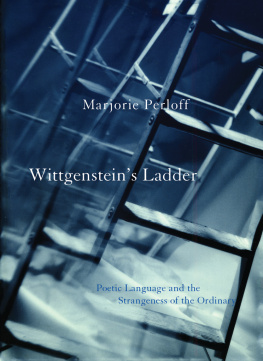Applying Wittgenstein
Continuum Studies in British Philosophy
Series Editor: James Fieser, University of Tennessee at Martin, USA
Continuum Studies in British Philosophy is a major monograph series from Continuum. The series features first-class scholarly research monographs across the field of British philosophy. Each work makes a major contribution to the field of philosophical research.
Applying Wittgenstein Rupert Read
Berkeley and Irish Philosophy David Berman
Berkeleys Philosophy of Spirit Talia Bettcher
Bertrand Russell, Language and Linguistic Theory Keith Green
Bertrand Russells Ethics Michael K. Potter
Boyle on Fire William Eaton
The Coherence of Hobbess Leviathan Eric Brandon
Doing Austin Justice Wilfrid Rumble
The Early Wittgenstein on Religion J. Mark Lazenby
E P. Ramsey, edited by Maria J. Frapolli
Francis Bacon and the Limits of Scientific Knowledge Dennis Desroches
Humes Social Philosophy Christopher Finlay
Humes Theory of Causation Angela Coventry
Idealist Political Philosophy Colin Tyler
Iris Murdochs Ethics Megan Laverty
John Stuart Mills Political Philosophy John Fitzpatrick
Matthew Tindal, Freethinker Stephen Lalor
The Philosophy of Herbert Spencer Michael Taylor
Popper, Objectivity and the Growth of Knowledge John H. Sceski
Rethinking Mills Ethics Colin Heydt
Russells Theory of Perception Sajahan Mian
Russell and Wittgenstein on the Nature of Judgement Rosalind Carey
Thomas Hobbes and the Politics of Natural Philosophy Stephen J. Finn
Thomas Reids Ethics William C. Davis
Wittgenstein and Gadamer- Chris Lawn
Wittgenstein and the Theory of Perception Justin Good
Wittgenstein at His Word Duncan Richter
Wittgenstein on Ethical Inquiry Jeremy Wisnewski
Wittgensteins Religious Point of View Tim Labron
Applying Wittgenstein
Rupert Read
Edited by
Laura Cook
Continuum International Publishing Group
The Tower Building, 11 York Road, London SE1 7NX
80 Maiden Lane, Suite 704, New York NY 10038
www.continuumbooks.com
Rupert Read and Laura Cook 2007
All rights reserved. No part of this publication may be reproduced or transmitted in any form or by any means, electronic or mechanical, including photocopying, recording, or any information storage or retrieval system, without prior permission in writing from the publishers.
British Library Cataloguing-in-Publication Data
A catalogue record for this book is available from the British Library.
ISBN-10: HB: 0-8264-9450-1
ISBN-13: HB: 978-0-8264-9450-4
Library of Congress Cataloging-in-Publication Data
A catalog record for this book is available from the Library of Congress.
CONTENTS
Permissions
The author wishes to thank the following for permission to use copyright material:
Jerry Goodenough for material from UEA Papers in Philosophy, Vol. 16. Read, R. (2005), Just in Time: Notes for the Meeting of Wittgenstein and Zen".
Cambridge University Press for permission to reproduce material included in: Read, R. (2002), Is What is Time? a Good Question to Ask?, Philosophy 78, 2443, and Read, R. (2003), Time to Stop Trying to Provide an Account of Time, Philosophy 77, 193209.
Blackwell for permission to reproduce material from Read, R. (2003), Against Time-slices, Philosophical Investigations 26:1, 2443.
Johns Hopkins University Press, for permission to reproduce extracts from the following material: Read, R. (2003), Literature as Philosophy as Psychopathology, Philosophy, Psychology, Psychiatry 10:2, 11524 and Read, R. (2003), On Delusions of Sense: A Response to Coetzee and Sass, Philosophy, Psychology, Psychiatry 10:2, 13542.
Routledge for material from Wittgenstein and Faulkners Benjy: Reflections on and of Derangement, in Gibson, J. and Huemer, W. (eds) (2004), The Literary Wittgenstein.
Taylor and Francis for Read, R. (2001), What does Signify Signify? Philosophical Psychology 14:4,499514, and Read, R. (2001), On Approaching Schizophrenia through Wittgenstein, Philosophical Psychology 14:4, 44975.
Faber and Faber for permission to use extracts from The Anecdote of the Jar, Fabliau of Florida and Thirteen Ways of Looking at a Blackbird from The Collected Poems of Wallace Stevens.
The publishers have made every effort to contact copyright holders. However, they would welcome correspondence from any copyright holders they have been unable to trace.
To the memory of a great applier of Wittgenstein,
James Guetti: 19372007
Acknowledgements
The author would like to thank the friends, colleagues and students who have helped bring this project to fruition: most especially of course, Laura Cook! Suggestions from participants at the UEA Wittgenstein Workshop have greatly shaped the material in this book, as have comments on earlier versions of various papers. In particular, Rupert would like to thank Phil Hutchinson, Alice Crary, Louis Sass, Jon Cook, J. M. Coetzee, Michael Dummett, Wes Sharrock, Nadine Cipa and Angus Ross.
And, of course, and above and beyond: Juliette.
The editor would like to thank the following people for the suggestions, conversations and encouragement which have kept this project moving, particularly Mark Gregory, Ian Whittley and Jerry Goodenough. Laura also owes a debt of gratitude to the author for his unstinting support and patience during this project. Finally, this project would have been impossible without Lucy Cook, best friend and mentor, whose advice, encouragement and support has helped quiet my self-criticism.
Both of us would like to thank the staff at Continuum for their great forbearance and assistance in the course of this project: most especially, Sarah Douglas.
We dedicate this book to the memory of James Guetti, a dear friend and mentor whose influence upon the material in this book is immeasurable. Guettis faithful and yet creative application of Wittgenstein has inspired the way in which we have come, in this manuscript, to conceive the role of the critic afresh. In an era when the crude marshalling of theory has often proved the order of the day, this deeply impressive attunement and subtlety has had a great impact upon the philosophical development of both the author and editor of this book. Guetti cautioned against the theorization of literature, which tends to render many of the better aspects of (literary, and other) texts inaudible. Perhaps his most important legacy is to be found in his ability to show his readers how to listen to literature, without silencing it with Theory. As such, it is hoped that this book will contribute to the lasting legacy of his work.
Abbreviations
| PI | Wittgenstein, L. (2001), Philosophical Investigations. Trans. G. E. M. Anscombe, Blackwell. |
| T-LP | Wittgenstein, L. (1921), Tractatus Logico-Philosophicus. Trans. Ogden, 1981, Routledge. |
| D1 | Dummett, M. (2000), Is Time a Continuum of Instants? Philosophy 75, 497-515. |
| D2 | Dummett, M. (2003), How Should We Conceive of Time? Philosophy 78, 387-96. |
Next page
